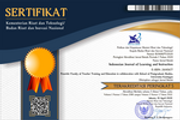POSTGRADUATE STUDENTS’ STUDY MODE AND UTILIZATION OF MOBILE TECHNOLOGIES FOR LEARNING IN NIGERIA
Abstract
Full Text:
PDFReferences
AbdulKalman, A. P. J. (2019). Why is education so important in our life? Retrieved on January 20, 2019 from Klient Solution Technology: http://www.klientsolutech.com/importance-of-education-in-life/
Adeyanju, L. (2012). What use is social media in education? Retrieved from Punch: http://.www.punchng.com/i-punch/what-use-is-social-media-in-education.
Amajuoyi, J. (2012). Towards effective integration of information and communication technology in Universal Basic Education: Issues and challenges to science and technology. Annual Conference of Science Teachers Association of Nigeria. HEBN Publishers.
Anthony, O. (2012). Challenges of effective use of ICT as a tool for implementing the UBE scheme. 53rd Annual Conference of Science Teachers Association of Nigeria. HEBN Publishers.
Bell, M., & Avis, P. (2016). Information technology in education. Australian Journal of Educational & Developmental psychology, 7, 79-91.
Bola, A. (2015). Perceptions of undegraduate towards the utilization of mobile technologies for learning in South-West, Nigeria. Unpublished Thesis in the Department of Educational Technology. Faculty of Education, University of Ilorin, Ilorin, Nigeria.
Chen, T. H., Szyliowicz, J. S., Lawson, F. R., Oskar, H. M., & Nakosteen, A. M. K. (2019). Definition of education. Retrieved on January 21, 2019 from https://www.britannica.com/topic/education
Daramola, F. O., & Omoyajowo, B. S. (2016). Information communication technology as a tool for improving Nigeria education at all level. International Journal Of Education And Evaluation, 2(2), 80.
Falade, A. A., Issa, A. I., & Alimi, A. E. (2016). Stakeholder’ perception of the integration of needed information technology equipment and facilities in distance learning in Nigeria. Jornal on Educational Technology (NiJET), 1(1), 144-150.
Ferreira, M. J., Moreira, F,. Pereira, C. S., & Durão, N. (2015). The role of mobile technologies in the teaching/learning process improvement in Portugal. Proceedings of ICERI2015 Conference 16th-18th November 2015, Seville, Spain, 4600-4634. Retrieved on January 21, 2019 from https://pdfs.semanticscholar.org/d68f/dd359f699609b33c33d71a5fec47b7ba7d00.pdf
Groden-Morrison, A. (2018). Mobile technology trends for 2019: What you need to know. Retreived on January 22, 2019 from https://www.alphasoftware.com/blog/mobile-technology-trends-for-2019-heres-what-you-need-to-know
Issa, A. 1., Onojah, A. O., Omoyajowo, B. S., Aderogba, A. J., Aboyeji, B. O., & Giwa, M. (2019). Postgraduate students’ adoption of mobile technologies for learning in South-West, Nigeria. International Journal of Information Processing and Communication (IJIPC), 7(1), 164-17. Retreived on January 18, 2019 from https://www.ijipc.com.ng/index.php/ijipc/article/view/290
Kennedy, P. (2013). ICTs in urdu medium schools in hyderabad: An evaluative study. American International Journal of and Arts Social Sciences, 138-141.
Mahdi, H. S., & Al-Dera, A. S. (2013). The impact of teachers’ age, gender, and experience on the use of information and communication technology in EFL teaching. English Language Teaching, 6(6), 57-67. Retrieved from http://www.ccsenet.org/journal/index.php/elt/article/viewFile/27261/16554
Meyerson, B. (2015). Top 10 emerging technologies of 2015. Retrieved from https://www.ubuntunet.net/sites/default/files/mtegaw.pdf
Nana, Y. (2012). Towards a perspective of Information and Communication Technology (ICT) in education: Migrating from Electronic Learning (E-Learning) to Mobile Learning (M-Learning). International Journal of Information and CommunicationTechnology Research, 2(8), 50-62.
Pearson, P. (2019). The importance of education. Retrieved on January 12, 2019 from https://www.pearson.com/corporate/about-pearson/the-importance-of-education.html
Rivero, V. (2019). 21 Definitions for a 21st-century education. Retrieved on January 21, 2019 from https://edtechdigest.com/2010/09/22/21-definitions-for-a-21st-century-education/
Saima, Y., Muhammad, T. A., Muhammad, M., & Maqsud, A. B. (2015). Comparative study of the availability and use of information technology in the subject of education. Public and Private Universities of Islamabad and Rawalpindi, 5(4). Retrieved on January 21, 2019 from http://doi.org/10.1177/2158244015608228
Sanni, T. A., Amosa, A. A., & Danmaigoro, H. (2018). Technology education students, use of web-based instruction for learning: A case of University of Ilorin, Nigeria. Association for Innovative Technology Integration in Education,1(1), 321-326.
UNESCO. (2019). Education transforms lives: Global education 2030 agenda through sustainable development goal 4. Retrieved on January 21, 2019 from https://en.unesco.org/themes/education
Uzuegbu, C. P., Mbadiwe, H. C., & Anulobi, J. C. (2013). Availability and utilization of instructional materials in teaching and learning of library education in tertiary institutions in Abia State. Wudpecker Journal of Educational Research, 2(8), 111-120. Retrieved on January 21, 2019 from http://wudpeckerresearchjournals.org/WJER/pdf
Yusuf, M. O., & Balogun, M. R. (2011). Student teachers' competence and attitude towards information and technology: A case study in a Nigerian University. Contemporary Educational Technology, 2(1), 18-36.
DOI: https://doi.org/10.25134/ijli.v2i2.1975
Refbacks
- There are currently no refbacks.
Copyright (c) 2019 Indonesian Journal of Learning and Instruction

This work is licensed under a Creative Commons Attribution-NonCommercial-ShareAlike 4.0 International License.

